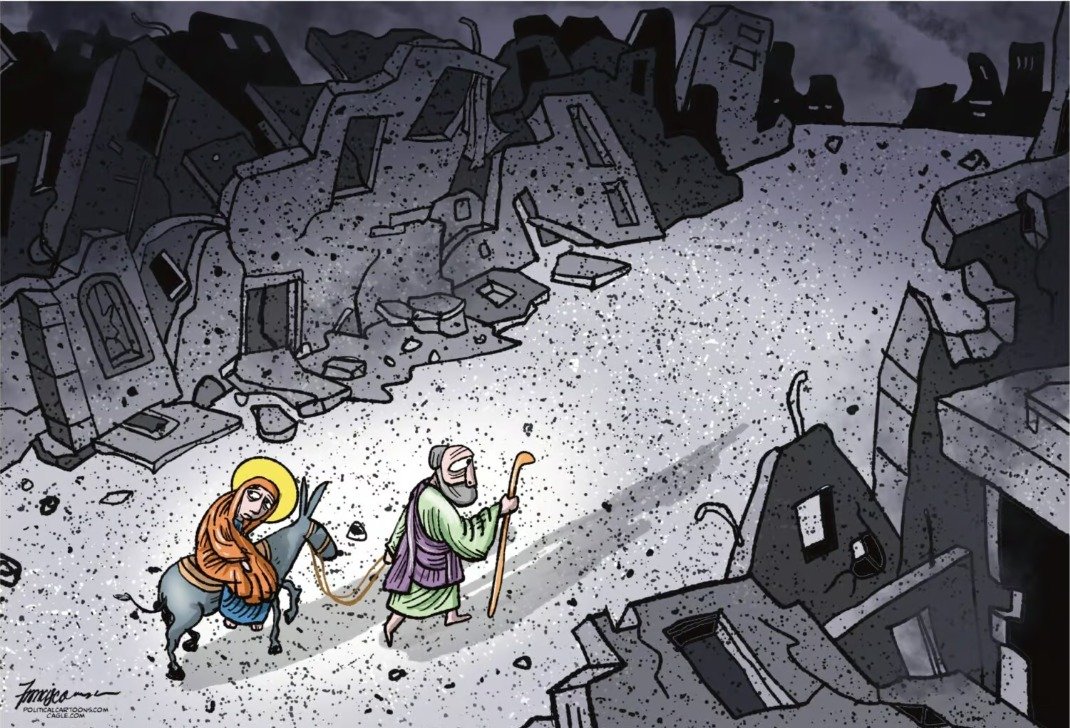Jack Nassar
“We, the Patriarchs and Heads of the Churches in Jerusalem, call upon our congregations to stand strong with those facing [sadness and pain] this year by foregoing any unnecessarily festive activities. We also invite the faithful to advocate, pray and contribute generously as they are able for the relief of the victims of this war and for those in dire need.”
That plea came from Christian leaders in Jerusalem in mid-November, and cast a somber shadow over the customarily joyous season in the Holy Land. The call was a reminder of the genuine meaning of the holiday: the narrative of Jesus’ birth gains profound significance against the backdrop of a land torn by conflict.
The scope of lost lives in the Israel-Hamas war is staggering, exceeding 1,200 in Israel and 19,000 in Gaza (as of Dec. 17). Over 50,000 Palestinians have been injured and 1.2 million displaced, thrust into a terrible state of uncertainty. Hundreds of thousands now find themselves without homes or livelihoods, bearing the harsh consequences of the widespread destruction of neighborhoods, residences and businesses. Additionally, over 500 Palestinians have been killed in the West Bank since the beginning of 2023. In Gaza, Christian churches, schools and hospitals – pillars of support for their communities – have also suffered immensely.
The loss of Christmas mass, liturgies and services in Gaza’s four churches – the Orthodox, Catholic, Episcopal and Baptist – is one more example of the profound impact of Israeli occupation on cultural and religious practices. But silenced church bells are not merely a Palestinian tragedy; it’s a sad chapter in the entire Christian world’s collective history.
Rather than taking sides or relying solely on prayers, it is our responsibility as Christians to actively engage in actions that contribute to lasting peace and justice. To promote peace and justice in global conflicts, it is crucial to condemn all atrocities unequivocally and work towards a resolution that prioritizes the well-being of all parties involved. This requires an active commitment to seek an end to occupation and violence, advocate for the rights and dignity of all individuals equally and promote a more compassionate world.
No Christians left
There’s a growing fear among Palestinian Christians that Christmas might be entirely absent in Gaza in December 2024. That would be unprecedented in the region’s rich and long Christian history. But it’s a real possibility as survivors, grappling with the aftermath of the war, are being forced to contemplate immigration in search of a better, more peaceful and stable life.
In the void left by traditional celebrations in 2023, however, the significance of Christmas remained undiminished. It emphasized the need for peace, justice, equal rights and collective efforts to address the root causes of conflict in the Holy Land.
Even in the midst of despair, humanity yearns for the light symbolized by the birth of the Messiah. Christ offers hope and the promise of a brighter future. In Palestine, Christmas spills into January for both Catholic and Orthodox churches. Let us carry the spirit of Christmas forward this month, uniting as Canadian and Palestinian churches in prayers for peace in the Holy Land. May this season’s silent celebrations be a testament to the enduring faith of the Palestinians, Israelis, and Canadians and a plea for an end to the suffering.
(Jack lives in Ramallah, Palestine, holding a master’s degree in political communications from Goldsmiths, University of London. Jack’s passion for fostering positive change is evident in his expertise, which extends to the public, private, non-profit and academic realms.)

